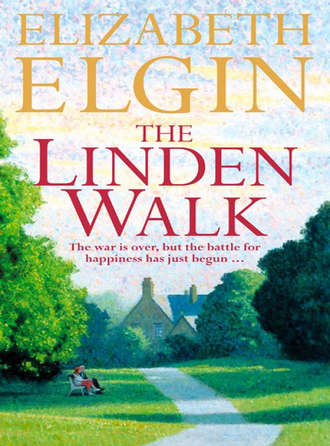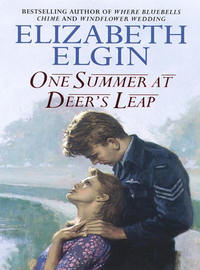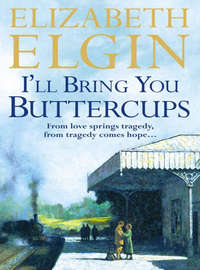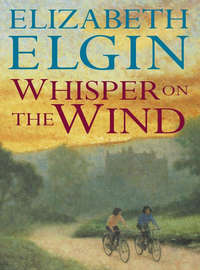
Полная версия
The Linden Walk
‘I often wonder about him – his background, I mean. I sometimes miss Scotland, but at least I know I can go there whenever I want. Karl can’t go back to Russia.’
‘True. Him once being a Cossack and loyal to the Tzar, it wouldn’t be wise. But he never speaks about his past. He attached himself to our family when they were trying to get out of Russia, and Mother told me they wouldn’t have made it without him. That’s why he’s still with us. We owe him.’
‘He’s very protective of you,’ Bill frowned.
‘I know he is, but you needn’t worry. When we are married I shall ask him if he wants to go back to London to Grandmother Petrovska and Uncle Igor.’
‘And if he doesn’t?’
‘Then he stays here, at Denniston. He’s no trouble, and he does all the gardening, remember.’
‘I’m no’ complaining.’ Bill Benson’s philosophy was to live and let live.
‘Good. So tell me, who rang you this morning?’
‘London. The agent I got in touch with wants me to go down there with my portfolio, and if he thinks I’m any good he’ll take me on. Mind, he’ll take ten per cent of all I make but he’ll earn every penny of it – do the selling and see to contracts and that sort of thing. He’ll haggle about price, too, something I’m not much use at.’
‘Of course he’ll take you on. You’re good. When shall you go?’
‘Soon …’
‘Then if you intend staying overnight, ask Aunt Julia if you can stay at Montpelier Mews. No point paying hotel bills when there’s a bed for the asking, for free.’
‘I thought it was we Scots who were meant to be mean! You Russians are every bit as canny.’
‘I’m not Russian – well, only half so. And born and bred in England. Do you mind, darling, that grandmother is a countess and that, as the daughter of a countess, mother is entitled to the courtesy, too. At least, that’s the way it used to be, in Russia. Mind, I shall be happy to be Mrs Benson. Are you looking forward to our wedding?’
‘Of course I am. It’ll be winter, soon, and gui’ cold in that studio of mine. Can’t wait to move in here.’
‘It was your own choice to stay put, so don’t moan. Let’s face it, here we are almost alone, and you still go on about waiting till our wedding night. It’s not a lot of fun when things get passionate and you start counting to ten. You’re always the one to put a stop to it and it ought to be the girl who says no.’
‘You’re joking, Miss Sutton.’
‘I’m joking, darling. But I’ll be glad when we’re married. December is a good time for a wedding. Short days, long cold nights. If this coal rationing lark goes on for very much longer, bed will be the only warm place.’
‘Tatiana!’ He let out a laugh. ‘Have you no shame? The granddaughter of a countess, reared by a nanny, taught by a French governess, with Karl always hovering to make sure the wind didn’t blow on you! Whatever happened to that ladylike lassie?’
‘The war happened, Bill,’ she said softly, eyes sad. ‘Oh, I know wars are immoral, but that one gave a whole generation of women their freedom. This ladylike lassie was away like a shot to London, translating.’
‘And you met a lot of wounded airmen …?’
‘Yes. And I met you, Bill.’
‘But what made you do it, darling? Escorting airmen with their faces burned away – didn’t it embarrass you, showing them around London, with people looking away and –’
‘No, it didn’t. I did it for Tim. And your face wasn’t as badly burned as some.’
‘No. I was blind,’ he offered without rancour.
‘Yes, but you aren’t now. Tell me, Bill –’ She changed the subject quickly, so she needn’t think about Tim. ‘– are you always going to paint flowers and florals?’
‘Why not? It’s what I do best and it brings in the shekels. I’m not going to live off my wife!’
‘No one wants you to, so don’t get all Scottish prickly about it! Just because I’m not short of a pound or two doesn’t mean you’re a kept man.’
‘Not short! The way I see it you’re filthy rich!’
‘I’ve been lucky. Mother didn’t have to marry money, exactly, but it seemed fortunate at the time that she fell in love where money grew on trees. And because of it, a lot of it came my way, through my father. Us Petrovskas hadn’t a bean. Left it all behind in St Petersburg – sorry, Leningrad.’
‘Aye, and when your granny died she left you this house, an’ all.’
‘True. But Grandmother Clementina, as I have often said, probably did it when she was tanked up on brandy. She hit the bottle in a big way, when my father was killed. And she didn’t leave it to me, exactly. Denniston House was her wedding present to my parents and she left things the way they were. If you want to split hairs, it was Grandfather Sutton who willed the money to me. He was a darling; didn’t deserve to be married to Clementina.’
An absolute old love, who had understood about Tim. The only grown-up, it had seemed, she could trust with her secret.
‘But Tatty – why should the old lady have taken on so? She had two other sons.’
‘Yes, but they weren’t her precious Elliot!’
‘That’s a gui’ peculiar way to speak of your dead father.’
‘Why is it? He didn’t like me. I was a girl. Why should I like him?’
‘Dislike a man you don’t even remember,’ Bill said softly, heeding the narrowed eyes, the disapproving mouth.
‘I do remember him. At least, I remember memories. Always unhappiness, and my mother sobbing …’
‘Then one thing I promise. I’ll not make you cry, sweetheart. And I’m in danger of getting sentimental and sloppy so I’d best be away to my celibate garret,’ he grinned. ‘Besides, I need to be up early – get the morning light. I aim to have the watercolour finished tomorrow – want something half-decent to show to the agent.’
‘Must you go, just yet?’ Tatiana teased her fingertips over his face. ‘It’ll be cold in the loft and you haven’t any paraffin left for your stove …’
‘Aye! We won a war and three years on we’re still rationed! Four-page newspapers, ninety miles of petrol a month for cars, a shortage of coal and the RAF airlifting food to Berlin instead of bombing it!’
‘Never mind. At the end of this month we’ll be allowed to use gas and electric fires again, so on October first you’ll be able to plug in and warm up.’
‘So I will. But why is this country in such a mess? It’s like we’re still at war. They’ve even rationed bread, now, and bread was never rationed, as I remember it, even though most of our wheat was brought here in convoys!’
‘Darling! I love it when you get on your soapbox – especially when you have a dig at Mr Attlee, and you a red-hot socialist! The war cost a lot of money – I suppose it’s got to be paid for, now. And you’ve got your National Health Service at long last. Free false teeth, free spectacles, pills and potions and operations for nothing. And no doctors’ bills coming in every month! So kiss me goodnight and go to bed. Would you like a hot-water bottle?’ she asked, eyes impish.
‘So what do you take me for – a jessie, or something?’
They were laughing now, and kissing, with Tatiana murmuring, ‘I love you, Sergeant Benson. Can’t wait for December.’
‘And you, hennie darling, will get your bottom spanked if you don’t stop your teasing! So one more kiss, then throw me out, eh?’
At the door he turned.
‘Oh and by the way, Miss Sutton, I love you, too. Even though you’re a filthy capitalist, I love you a lot!’
‘There now. The Whitecliffe jewels.’ Julia Sutton arranged lockets, necklaces and rings on the coffee table beside the fire. ‘I’ll leave the pair of you to it. Take what you want, Lyndis.’
‘They’re so beautiful.’ Lyn took a heavy gold locket containing a lock of pale yellow baby hair. ‘Who did this curl belong to?’
‘Haven’t a clue, though I’d like to think it was my mother’s hair,’ Julia smiled. ‘Mother was very fair. Glad you like them. Didn’t think you young ones would go for old-fashioned stuff like this.’
‘Old-fashioned, Mrs Sutton? But they’re family history. Much more special than going to a jeweller’s and asking to try on the third one down on the left of tray twenty-six.’
‘If there were decent rings in the shops to choose from, don’t you mean, Lyn? Why is this war lasting so long – the shortages, I mean. Do without. Export or die, the government tells us. Tighten your belts. Though I suppose it’s better, now, than it was after my war,’ Julia frowned. ‘At least war heroes aren’t being thrown on the scrapheap this time around, and forced to beg or sell bootlaces on street corners. It was an obscene war.’
‘Don’t, dearest.’ Drew took his mother’s hand and squeezed it tightly. ‘Your war and my war – they’re both over, now. It’s just that it’s taking longer than we thought to clear up after this one, and – I’ll get it,’ he said, as the phone began to ring.
He hurried into the hall and it gave Lyn the chance to say, ‘Look – I’m not being awful, or anything, but is – well – is Kitty’s ring amongst these? I wouldn’t want to choose hers and upset Drew.’
‘No, Lyndis. Kitty’s ring was opals and pearls and she – we-e-ll – it went with her.’
‘Good. I’m glad. I mean, I’m glad she was – was –’
‘Wearing it at the end,’ Julia said, matter-of-factly. ‘And you might as well know the whole of it. She wore her wedding dress, too. Amelia – her mother – sent one over from America for her. It was hanging here at Rowangarth with a sheet draped over it, waiting till they could be married.’
‘Then I’m glad she wore it, but so sad …’ Lyn whispered.
‘Sad. I told Drew when I wrote to him after the funeral. He agreed with what I had done. He was in the Pacific …’
‘I remember.’
‘Of course you do! You and Daisy were Wrens together. Sorry, Lyndis. Shouldn’t have said what I did.’
‘But I began it, asking about Kitty’s ring. Just because Drew and I are going to be married doesn’t wipe out all memory of her. They were deeply in love, and I accept it.’
‘So were Andrew and I. Passionately. But love can come again – remember that if you have doubts. Tell yourself that love can happen twice, though differently. It did for Nathan and me. Kitty was, is, and always will be. It’s going to be up to you, Lyndis, how you handle it, but never forget that I do understand and if ever you want to talk to me about anything –’
‘Talk about what?’ Drew stood in the doorway. ‘Secrets between you already?’
‘Idiot! Of course not. With her mother in Kenya, I offered to stand in if Lyndis wanted to talk about – well, you know – woman’s things. Anyway, who was that on the phone?’
‘Daisy. She insists we go over so she can admire the ring – she wants to have a wish on it, she says.’
‘It took you a long time to say that,’ Julia smiled, relieved the awkward moment had passed.
‘Not really. I had a word with Keth, too. About cars.’
‘So now you can have a word with your intended – about rings. And make sure you’ve got your key with you when you go out. I’m going to meet Polly at the Bothy at eight – okay? And like I said, Lyndis – feel free …’
And with that she was off, banging the door behind her, taking the stairs two at a time, as she always did.
‘Have you chosen?’ Drew asked softly.
‘N-no. I haven’t even looked, properly. I feel embarrassed, sort of; don’t want to pick out the biggest and best.’
‘Why ever not? It wouldn’t worry Mother. She’s never been one for jewellery; keeps giving pieces of this lot away. She gave Lady pearl eardrops for her twenty-first and Daisy got a sapphire and diamond brooch as a christening present. There are a couple I like, though.’ He laid two rings on his hand; one a sapphire, one an emerald. ‘Mother would want you to have something decent. Feel free, like she said.’
‘I like them, too. They’re both beautiful,’ Lyndis whispered, wishing her cheeks didn’t burn so. ‘I think you should choose, for all that.’
‘Then the emerald it is. It matches your eyes, Lyn. Try it on.’
‘Tell you what – the ring that fits best must be the one.’
‘Then it looks like it’s the emerald,’ Drew smiled when the square-cut stone set with diamonds slipped on easily, whilst the sapphire refused to budge past her knuckle.
‘The emerald it is. And anyway, Daisy has a sapphire ring. Wouldn’t want her to think I was copying hers. Will you put it on for me, Drew, and kiss me? And then we’ll put everything back in the box and give it to your mother, before she goes out. She’ll want to know which one I’ve chosen. And will you tell me why I feel so light-headed and floaty? I can’t seem to take all this in.’
‘We-e-ll, I ought to say it’s because of the wonder of the moment, but it’s probably because you arrived late and didn’t want any supper. Now give me your hand, Lyn Carmichael, and bless you for saying you’ll have me. I promise we’ll be happy, cariad.’
‘Drew! Who told you the Welsh for darling?’
‘Who do you think? The adorable Blod, of course, that time we stayed with her. Have you heard from her, yet?’
‘About us? No. She won’t have got my letter, though I think she’ll cable me back when she’s had time to get over the shock.’
‘You’re happy about us, Lyn?’ He tilted her chin, kissing her gently.
‘I’m happy. I’m very happy, Drew.’
‘Fine. So let’s return the sparklers, then go and see Daiz …’
It was as they walked hand in hand to Foxgloves that Drew said, ‘By the way, if we decide on a summer wedding, how about June the eighteenth? Entirely up to you, mind – will it be okay for you date-wise? The curse, I’m talking about.’
‘I – I – yes. Fine,’ she gasped, cheeks blazing, taken aback by the nonchalant reference to her periods. Drew had always been so quiet; never had a sister of his own. Not a live-in sister to talk to about such things. He’d been in the Navy, of course. There would have been talk on the mess decks, she supposed.
Yet the explanation was simple. Drew and Kitty had been lovers, would have discussed such things. They’d have had to, though Lyn was as sure as she could be that Kitty wouldn’t have cared if she got pregnant, wouldn’t have –
‘Penny for them?’ Drew smiled.
‘I – oh, nothing of importance, really. Dates, I suppose. I ring them round as soon as I start a new diary, so I’m sure the eighteenth is fine.’
The ease with which she spoke amazed her; the laugh, too.
‘That’s settled, then. Daiz will be glad about that. She’s been going on about it all week. And might I ask what you find so funny?’
‘You and me, Drew, that’s what. Sorry. I didn’t mean to laugh about something so important, but think – a week ago we were friends, yet now we’re all at once – well, personal. So can we,’ she said breathlessly, ‘whilst we’re on the subject of things personal, talk about children, too?’
‘Fine by me. You want some, don’t you? I know I do.’
‘I want children, Drew, and I’d like to have them before I’m thirty, or at least have made a start. So if you don’t mind, I’d like us not to worry about – well …’
‘Being careful? A honeymoon baby?’
‘Exactly,’ she whispered, taken aback once more by his directness, knowing that almost certainly he had talked this way before.
‘Okay. Point taken. Where are we going for our honeymoon, by the way? Abroad is out, thanks to the government’s stupid restrictions. Paris would have been great. And there’s Daisy, waiting for us.’ Quickly, he kissed her cheek. ‘Impatient as ever.’
And though it was almost dark, Lyn could hear the smile in his voice and was grateful for it. And love for him washed over her and made her glad. Happy, she supposed, or as near as made no matter. If Kitty wasn’t so often there to remind her, that was.
‘Hi there, Purvis,’ she called and ran into Daisy’s welcoming arms.
‘Let’s be seeing it then,’ Daisy laughed, holding up her cheek for Drew’s kiss, shoo-ing them into the sitting room. ‘Oh, my goodness, Carmichael. What a beauty!’ She held out her hand for the ring, slipping it on, closing her eyes as she turned it three times on her finger. ‘And don’t ask me what I wished for ’cause I’m not telling.’
‘Just a minute, ladies, before you start oh-ing and ah-ing over rings and weddings and things,’ Keth laughed. ‘Would you mind telling me why the pair of you still use each other’s surname? You aren’t in the Forces, now.’
‘True, Keth. But we both did a fair stint in the war, and using surnames was the order of the day. We’re bound to revert, sometimes, to the old ways. Daisy will always be Wren Purvis-from-the-bottom-bunk to me.’
‘And I was so glad to be Purvis – remember, Lyn? Dwerryhouse was such a drag of a name. The times people said, “Dwerry-what? How do you spell it?” So now you know, darling, and why don’t you two pop upstairs to the cubbyhole whilst we talk about rings and weddings and things. You said you had something you wanted to talk to Drew about. And don’t wake the baby,’ she warned as they disappeared, fugitives from wedding talk. ‘And I shouldn’t tell you what I wished for, but do you want two or three …?’
‘Three, please,’ Lyn laughed, ‘though four would be marvellous. That house is big enough for ten children. And oh, Daisy, you’re such a love. Did I ever tell you so?’
‘Often. But only because it’s completely true.’
So they laughed again and it was as if they were Leading-Wren Carmichael and Purvis-from-the-bottom-bunk again and lived in a billet called Hellas House in bomb-shattered Liverpool, and worked underground in a hot, airless Communications Office. Because they knew they would never completely forget their war, nor would they want to. Good times and bad.
‘Well now. This is a lovely surprise. Do sit down, Miss Lyndis.’
‘Thanks. But could you call me just Lyndis or Lyn, Miss Clitherow? Drew said you wanted to see my ring.’
‘Well, not really. I have seen your emerald before. What I really wanted was the chance to wish you much happiness. It makes an old lady very glad to see it all coming right for Sir Andrew, you know. And could I presume to ask you to open the window a little? Can’t abide a stuffy room. Most kind …’
So this was how it was to be, Lyn thought as she unscrewed the window catch. Sir Andrew and Miss Lyndis. A far cry from the sailor on a minesweeper and she and Daisy meeting him when his boat docked.
‘How’s that? Feel a draught?’
‘That is fine, thank you. I wouldn’t have asked, but it’s my hands. A little arthritic. Fiddling catches …’
‘Miss Clitherow! If I can’t open a window without –’ She bit back her words, knowing at once it was the wrong thing to have said. Agnes Clitherow was a servant of the old order and did not ask the woman who was to be lady of the house to open windows. ‘And I’m pleased we can have this chat,’ she rushed on, ‘because you have been here so long, know so much about the Rowangarth Suttons. I’d be so glad if you would sometimes talk to me about them. My ring, for instance. You said you had seen it before. When, exactly?’
‘When Sir Gilbert Sutton gave it to his wife, Lady Mary – Sir Andrew’s great-grandmother – on their tenth wedding anniversary. I was housemaid to the Suttons, then.’
‘And you came to Rowangarth …?’
‘I came here with Lady Helen as a bride. By the time she was married I had been trained up to parlour maid. It seemed natural for me to accept when she asked me to come here to Rowangarth with her – as housekeeper, mind. Such a promotion, and me only four years older than Miss Helen. But I put my hair into a bun and tried to look severe, so no one quite knew how old – or young – I really was.’
‘But, Miss Clitherow – that means you were born in 1856 and that you are –’
‘In my ninety-second year, Miss Lyndis, and you are one of the few who knows it.’
‘Then I won’t tell. Promise.’
Come to think of it, there was a lot she would not tell, Lyn brooded, like the future Lady Sutton being illegitimate. Strange that for so long she had never known who her real mother was. Such a shock – a wonderful shock – to discover it was really the woman she had always believed to be her aunt. Blodwen, who had given her all the love she had ever known, and taken over her upbringing when as a young girl she was put in charge of the ship’s nurse at Mombasa, en route for school in England. And never, had she but known it, to return to Kenya. Myfanwy and Blodwen. Twin sisters. Chalk and cheese. Myfanwy, her name changed to Margot, looking forward at her wedding to Jack Carmichael to a lady’s life in Kenya; Blodwen, two months pregnant with Jack’s child, loving him so much, yet saying not one word about it until it was too late. And Lyndis, their indiscretion, being grudgingly taken to Kenya by Jack’s wife.
‘Did you know I’m to wear Daisy’s wedding dress, Miss Clitherow?’ Forget the past, Lyndis! Her father and her real mother happy at last, even though they are miles away, in Kenya! ‘It’s so beautiful. I think it’s better, even, than Princess Elizabeth’s.’
‘Ah, yes. A fairytale wedding. Such a glorious gown. It was right and proper the princess should be given an extra coupon allowance for it.’
‘Hm. I wonder, at two clothing coupons for one yard of material, just how many that wedding dress gobbled up. And I still think Daisy’s dress is the nicest I’ve ever seen. So soft and full and floaty. She offered it to Tatiana, you know, but Tatty wants a quiet wedding.’
‘Miss Tatiana has grown into a lovely person. It’s sad her father didn’t live to walk her down the aisle. And sad she never had a brother. Things would have been very different at Pendenys Place if that little boy had lived.
‘But you wanted to know about the Rowangarth Suttons, about how it was. Lady Helen and Sir John. Miss Helen she was then. Helen Stormont and hardly out of the schoolroom when they met.’
‘Tell me,’ Lyndis smiled, ‘was it romantic?’
‘Oh my word, yes! Her coming-out ball. I was in service, then, with the Stormonts as parlour maid and they had rented a house in London for the social season. I was one of the lucky ones they took to London with them. I remember seeing Miss Helen before she went off to that ball. Dressed in baby blue silk, trimmed with white lace, and white rosebuds in her hair. It was that night she met Sir John and fell head over heels in love. Sir John was smitten, too; but then, the Rowangarth Suttons have always been lucky in love.
‘Miss Julia was twice lucky. Doctor Andrew, her first husband, was a fine gentleman. Lady Helen adored him. And the Reverend has made Miss Julia happy, too,’ the old woman smiled, eyes misty with remembering. ‘And now Sir Andrew is to be married. I pray I’ll be spared to see that day.’
‘Miss Clitherow – of course you will. June the eighteenth, next year. Not long to wait.’
‘I suppose not. The poor young man has waited long enough. But for that dreadful bomb, he and Miss Kitty would have – Oh, I am so sorry. Shouldn’t have said that. Whatever was I thinking about? Getting old, you see. Sometimes I don’t think.’ Her voice trembled, tears filled her eyes. ‘Forgive me?’
‘Miss Clitherow, don’t be upset. Please, please don’t cry.’ Gently Lyndis wiped away the tear that ran down the wrinkled cheek, then took the agitated hands in her own. ‘I know how much everyone loved Kitty. I held Daisy in my arms and we both cried for her when she was killed, and for Drew, too.
‘Kitty will always be remembered because she was such a special person. I know that and I won’t ever try to take her place in the Clan. But I know how much you care for Drew and I promise always to love and care for him. There now – does that make you happy?’
‘It does, Miss Lyndis. And bless you for not taking offence where none was meant. I think you will do very nicely for Sir Andrew. Just then, when you dried my tears and spoke so kindly and gently to me, you reminded me of Lady Helen. Oh, yes, Sir Andrew will be twice happy, just as Miss Julia has been.’
‘Thank you. And I think you are tired. Shall I go, now, and let you have a little sleep?’
‘Most kind. Yes, I generally have a little nap about this time.’









